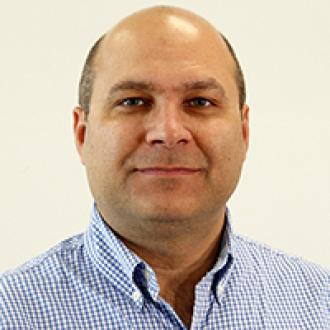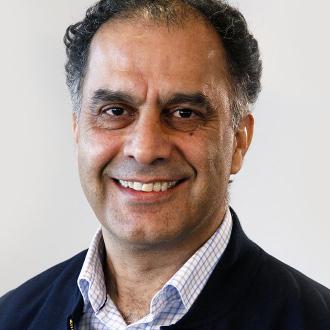- Undergraduate
Computer Science BSc (Hons)
Overview
Why study at the University of West London?
- Our computer science courses are ranked #1 in London for overall student satisfaction in this year's NSS
- Ranked 30th university in the UK - The Guardian University Guide 2025
- Number 1 London university for overall student satisfaction - National Student Survey 2024**
- Best university for Student Experience and Teaching Quality in the UK - The Times and Sunday Times Good University Guide 2024
Why study this course?
This computer science degree is designed to meet the high demand for IT graduates with up-to-date knowledge and skills.
Accredited with Full Incorporated Engineering status (IEng) by the Institution of Engineering and Technology (IET), this course will give you a qualification recognised by the industry once you graduate.
Influenced by the latest research and industry requirements, the course will focus on practical skills. We will give you the tools and knowledge to design and develop software for a variety of applications, from mobile systems to large-scale solutions for enterprises.
You will also learn about the science behind computing and software development and the impact of artificial intelligence (AI).
Study options
As well as the regular Full-time 3 year option, this course can be studied with a placement (UK students only).
Select your desired study option, then pick a start date to see relevant course information:
Start date:
If your desired start date is not available, try selecting a different study option.
Why study Computer Science with us?


What our students say…
I picked UWL because the facilities looked amazing and I loved the focus on helping students secure the right career once they graduate.




Course detail & modules
You will start your computer science course with the fundamentals of computing and software development. During regular laboratory sessions, you will apply what you have learned through hands-on practice.
As you progress, we will introduce the core concepts for producing mobile and business applications. This will give you a good understanding of computer science in a professional context.
Throughout the course, you will also develop the professional skills that will be essential to your future career. A team project, based around finding effective solutions to an IT issue, will not only help you build your problem solving IT experience but also enhance your team-working and communication skills.
In the final stages of your course, you will examine advanced concepts, such as AI and computer security, giving you a better understanding of the current challenges and opportunities in the IT industry.
For your final project, you will design a comprehensive and sophisticated software application. This is an excellent opportunity to apply your learning and showcase your skills.
Study options
As well as choosing a regular full-time 3-year degree, this course can be studied with the following option:
Placement*
Who is it for: The placement route for this course is open to UK students only.
You also have the opportunity to take this course with an optional industrial placement after your second year (Level 5). This will help to enhance your CV and give you experience in computing in a professional environment. You will also be able to use your placement experience to help choose your final year project when you return to your studies.
*As we are in unprecedented and unpredictable times, there is no guarantee that you will be successful in securing a placement in the UK in the future.
If you choose a course with a placement/internship route we would like to advise you that if a placement/internship opportunity does not arise when you are expected to undertake the placement then the University will automatically transfer you to the non-internship route. This is to ensure you are still successful in being awarded a degree.
Course subject to approval
Compulsory modules
-
Programming
This module will introduce students to problem-solving skills and key programming principles in order to translate a problem description into a sequence of steps to be executed by a computer.
The module will cover basic programming concepts and fundamentals including:
- an overview of programming paradigms and techniques
- analysis of problems and design using pseudo-code and flowcharts
- basic program elements and structure
- development supported by version-controlled code repositories.
-
Computer Architecture
This module will help you to learn the basic concepts behind current computer hardware, software and supporting technologies. As you learn these principles, you will understand how computers work beyond the statements of their high-level language, and this will allow you to write more efficient code.
-
Mathematics for Computing
This module will introduce students to the main concepts and techniques of discrete structures and their applications in computer science. Main areas covered by the course include logic, set theory, relations and functions and combinatorics.
-
Data Communications
This module adopts a top-down approach to data communication networking, beginning at the application layer and working down towards the physical layer. After completing the five-layer network architecture, the module focuses on wireless network and its security. In summary, the following aspects will be covered:
- application layer
- transport layer
- network layer
- data link layer
- 802.11 WIFI protocol
- principle of cryptography
- Wireless security: WEP and WPA
-
Information Systems and Databases
You will gain the knowledge and skills to design and implement a relational database. It will cover information security and database management issues and an awareness of the central role of relational and other types of databases.
-
Algorithms and Data Types
This module will help you to gain the knowledge and competence to deal with basic data structures and algorithms. You will learn how to specify collections using abstract data types (ADTs) and to implement them using a variety of techniques such as linked lists and trees. You'll also use a range of algorithms, including searching and sorting.
Compulsory modules
-
Theory of Computation
The aim of this module is to provide you with the knowledge and understanding of fundamental concepts of computational theory and computational complexity. You will learn how to examine whether a given problem can be solved computationally. The module aims to introduce computation science, to model complex dynamic systems, and diagramming models.
-
Mobile Web App Development
This module will allow you to gain experience in developing mobile web applications, and have an introduction to the tools, languages and design techniques required for building functional applications. During the module you will gain exposure to a programming language that can support native mobile application development, and you will be introduced to the Model-View-Controller (MVC) software design pattern.
-
Artificial Intelligence
In this module you will gain insights into key techniques within the field of artificial intelligence (AI). Aspects of AI you'll cover include agents, environments and learning as well as techniques such as regression, classification, clustering, reinforcement learning, learning recommendation and decision support systems.
-
Programming Language Paradigms
This module aims to introduce different programming methodologies and paradigms and to familiarise you with software design and implementation, using Object-Oriented Programming, Functional Programming, and Logic Programming.
-
Computing Group Project
The overall aim is to take a practitioner’s approach to the problems of developing software applications for a case study using Agile methods and to provide you with the experience of working collaboratively as part of a project team.
The module aims to raise an awareness of the appropriate methodology required for given contexts and to explore business process analysis, business rules, business cases, and other techniques as a means of establishing system requirements.
-
Advanced Algorithms
This module aims to introduce algorithms using pseudocode and to provide you with a basic of understanding of how to write and analyse algorithms, and computational complexities.
Compulsory modules
-
Applied Software Engineering
Software engineering is concerned with the construction of large software programs. This module will bring together the tools and techniques you covered in earlier modules that deal with software development, drawing on concepts from object-oriented and relational design.
This module aims to introduce you to software engineering concepts such as software architecture and design and their importance in the implementation of software systems. Additionally, to critically evaluate green and sustainable (Individual, Social, Economic, Environmental, Technical) software systems.
-
Project
You will investigate a topic of interest and prepare a project proposal. You will then present your ideas to the school for approval and once this has been approved, you will begin a detailed literature review of your chosen field. You will choose and follow a suitable development methodology leading to an implementation which you will evaluate.
Optional modules
-
Machine Learning
Machine learning is an application of artificial intelligence that provides systems with the ability to automatically learn and improve from experience without being explicitly programmed.
This module familiarises you with some basic machine learning algorithms and techniques and their applications, as well as general questions related to analysing and handling large data sets. Several software libraries and data sets publicly available will be used to illustrate the application of these algorithms. The emphasis will be thus on machine learning algorithms and applications, with some broad explanation of the underlying principles.
-
Cyber Security
You will be introduced to fundamental cyber security concepts including Cryptography, Authentication, Authorisation, and Auditing with an emphasis on their application.
-
Distributed Systems
You will cover the fundamental concepts and models, algorithmic and architectural techniques, developmental principles and approaches of modern distributed systems. You will enhance your critical analysis, problem solving and technical skills in distributed systems software design and implementation.
-
Databases and Analytics
There has been an explosion in data, much of which is not fully structured, but contains valuable information such as search trends, consumer behaviour and other patterns. This module aims to cover some of the developments in the broad range of "Big Data" problems. It will give you a good understanding of data structures, software development procedures and the range of analytical tool used to undertake a wide range of standard and custom analyses to provide data solutions to these issues.
-
Human-Centred Computing
This module is about human and technical aspects of interactive computing systems and organisations. In the course of taking this module, you'll consider the interplay between human users, designers, developers and computers. Therefore, its basis is in psychology and human factors as well as in software engineering and interaction design.
-
Functional Programming
This module provides you with the chance to gain further experience with another programming paradigm. You will learn how to write programs using a functional programming language, Haskell.
Functional programming is a programming paradigm that treats computation as the evaluation of mathematical functions and avoids changing-state and mutable data. For example, building an application with Functional Programming following the model Function as a Service (FAAS) is one way of achieving a "serverless" architecture and is used when building microservices applications of cloud computing.
Entry requirements
These can include:
- A Levels at grade B, B and C, or above
- BTEC Extended Diploma with Distinction, Merit, Merit
- Access to HE Diploma
- T Levels
You also need GCSE English and Maths (grade 9 – 4 / A* - C) or Level 2 equivalents.
Looking for BSc (Hons) Computer Science with Foundation Year?
Mature applicants (aged 21+): If you do not hold the qualifications listed but have relevant work experience, you are welcome to apply. Your application will be considered on an individual basis.
Level 5 (year 2) entry
To directly enter the second year of this course you will need to show appropriate knowledge and experience. For example, you are an ideal candidate if you have 120 undergraduate credits at Level 4 or a CertHE in a related subject area.
Level 6 (year 3) entry
To directly enter the third year of this course you need to show appropriate knowledge and experience. For example, you are an ideal candidate if you have 240 undergraduate credits (at Levels 4 and 5), a DipHE, Foundation Degree or HND in a related subject area.
Looking for BSc (Hons) Computer Science with Foundation Year?
You need to meet our English language requirement - a minimum of IELTS 5.5 for each of the 4 individual components (Reading, Writing, Speaking and Listening). Visit our English language requirements page for information on other English language tests we accept.
You also need academic qualifications at the same level as UK applicants. In some countries where teaching is in English, we may accept local qualifications. Check for local equivalents.
We offer pre-sessional English language courses if you do not meet these requirements.
Looking for BSc (Hons) Computer Science with Foundation Year?
Mature applicants (aged 21+): If you do not hold the qualifications listed but have relevant work experience, you are welcome to apply. Your application will be considered on an individual basis.
Level 5 (year 2) entry
To directly enter the second year of this course you will need to show appropriate knowledge and experience. For example, you are an ideal candidate if you have 120 undergraduate credits at Level 4 or a CertHE in a related subject area.
Level 6 (year 3) entry
To directly enter the third year of this course you need to show appropriate knowledge and experience. For example, you are an ideal candidate if you have 240 undergraduate credits (at Levels 4 and 5), a DipHE, Foundation Degree or HND in a related subject area.
Looking for BSc (Hons) Computer Science with Foundation Year?
Fees & funding
Please note:
- Fees for the 2026/27 academic year and onwards may be subject to Government regulation and change.
- Tuition fees are charged for each year of your course. If your course runs for two years or more, you will need to pay the fee for each academic year at the start of that year.
- If your course runs for less than two years, the cost above is for your full course and you will need to pay the full fee upfront.
- If no fee is shown above then the fees for this course are not available yet. Please check again later for updates.
International students - funding your studies
We offer scholarships for international students including International Ambassador Scholarships.
Further information about funding and financial support for international students is available from the UK Council for International Student Affairs.
Teaching staff
Dr Sama Aleshaiker
I am a lecturer in Computer Science at University of West London. My PhD research focused on applying a new methodology that could improve and facilitate collaboration and communication systems for medical and learning purposes.
I am a lecturer in Computer Science at University of West London. My PhD research focused on applying a new methodology that could improve and facilitate collaboration and communication systems for medical and learning purposes.
Study & career progression

Popular careers and jobs for computer science degree graduates include:
- interaction designer
- software architect
- software engineer
- software developer
- systems analyst
- web developer
- UX designer
- mobile app developer
- IT project manager
- information security analyst
- AI engineer
- video game developer.
You may also want to progress your studies to explore a related field or specialise on a postgraduate course.
How to apply

You can apply online at any time by following the link below.
Our application form will ask you for some information about what you want to study, your previous qualifications or experience, and how we can contact you.
Want to ask us a question first? We would love to hear from you. Contact us free on:
- 0800 036 8888
- courses@uwl.ac.uk
Apply for this course
Next steps after making your application
We aim to make a decision on your application as quickly as we can. If we need any more information about your qualifications, we will be in touch.
In the meantime, come and visit us and find out more about what studying at UWL is like. Sign up for an open day or join a campus tour.
Visit us and see for yourself
Talk to our tutors and find out about our courses and facilities at our next open day or join a campus tour.
Our prospectus
All of our courses in one place - download now or order a hard copy.
We're here to help
Any questions about a course or studying at UWL? We're here to help - call us on 0800 036 8888 (option 2, Monday – Friday 10am-4pm) or email us on courses@uwl.ac.uk.

Head to the UCAS website where you can apply using:
- our institution code - W05
- the UCAS course code (below)
Want to ask us a question first? We would love to hear from you. Contact us free on:
Apply for this course
- Institution code
- W05
- UCAS code
- currentVariantData.field_p_cv_ucas_code
Next steps after making your application
We aim to make a decision on your application as quickly as we can. If we need any more information about your qualifications, we will be in touch.
In the meantime, come and visit us and find out more about what studying at UWL is like. Sign up for an open day or join a campus tour.
Visit us and see for yourself
Talk to our tutors and find out about our courses and facilities at our next open day or join a campus tour.
Our prospectus
All of our courses in one place - download now or order a hard copy.
We're here to help
Any questions about a course or studying at UWL? We're here to help - call us on 0800 036 8888 (option 2, Monday – Friday 10am-4pm) or email us on courses@uwl.ac.uk.

Head to the UCAS website where you can apply using:
- our institution code - W05
- the UCAS course code (below)
Want to ask us a question first? We would love to hear from you. Contact us free on:
Apply for this course
- Institution code
- W05
- UCAS code
- currentVariantData.field_p_cv_ucas_code
Next steps after making your application
We aim to make a decision on your application as quickly as we can. If we need any more information about your qualifications, we will be in touch.
In the meantime, come and visit us and find out more about what studying at UWL is like. Sign up for an open day or join a campus tour.
Visit us and see for yourself
Talk to our tutors and find out about our courses and facilities at our next open day or join a campus tour.
Our prospectus
All of our courses in one place - download now or order a hard copy.
We're here to help
Any questions about a course or studying at UWL? We're here to help - call us on 0800 036 8888 (option 2, Monday – Friday 10am-4pm) or email us on courses@uwl.ac.uk.

You can apply online at any time by following the link below.
Our application form will ask you for some information about:
- what you want to study
- your previous qualifications or experience
- your visa (if required)
- how we can contact you.
Want to ask us a question first? Our dedicated international students’ team would love to hear from you.
- email international@uwl.ac.uk
Apply for this course
Next steps after making your application
We aim to make a decision on your application as quickly as we can. If we need any more information about your qualifications, we will be in touch.
In the meantime, come and visit us and find out more about what studying at UWL is like. Sign up for an open day or join a campus tour.
Visit us and see for yourself
Talk to our tutors and find out about our courses and facilities at our next open day or join a campus tour.
Our prospectus
All of our courses in one place - download now or order a hard copy.
We're here to help
Any questions about a course or studying at UWL? We're here to help - call us on 0800 036 8888 (option 2, Monday – Friday 10am-4pm) or email us on courses@uwl.ac.uk.

You can apply to us in two ways:
- on the UCAS website you will need our institution code (W05) and the UCAS course code (at the top of this page)
- directly on our website – follow the ‘apply now’ link below
Want to ask us a question first? Our dedicated international students’ team would love to hear from you.
- Ask the International Recruitment Team a question
- learn more about international student applications
- find out more about why you should study in London at the Career University.
Apply for this course
Next steps after making your application
We aim to make a decision on your application as quickly as we can. If we need any more information about your qualifications, we will be in touch.
In the meantime, come and visit us and find out more about what studying at UWL is like. Sign up for an open day or join a campus tour.
Visit us and see for yourself
Talk to our tutors and find out about our courses and facilities at our next open day or join a campus tour.
Our prospectus
All of our courses in one place - download now or order a hard copy.
We're here to help
Any questions about a course or studying at UWL? We're here to help - call us on 0800 036 8888 (option 2, Monday – Friday 10am-4pm) or email us on courses@uwl.ac.uk.
Search for courses
Student life at UWL
Important notes for applicants
Disclaimer
*Modern universities - defined as higher education institutions that were granted university status in, and subsequent to, 1992.
**The National Student Survey 2023 and 2024 - Average of answers to all questions by registered student population. Excludes specialist institutions.
Testimonials - our students or former students provided all of our testimonials - often a student from the course but sometimes another student. For example, the testimonial often comes from another UWL student when the course is new.
Optional modules - where optional modules are offered they will run subject to staff availability and viable student numbers opting to take the module.
Videos - all videos on our course pages were accurate at the time of filming. In some cases a new Course Leader has joined the University since the video was filmed.
Availability of placements - if you choose a course with placement/internship route we would like to advise you that if a placement/internship opportunity does not arise when you are expected to undertake the placement then the University will automatically transfer you to the non-internship route, this is to ensure you are still successful in being awarded a degree.














